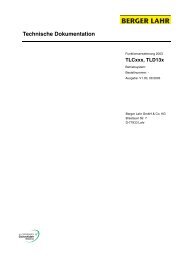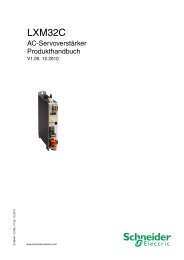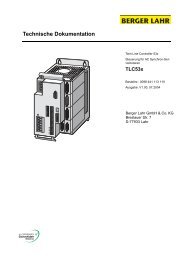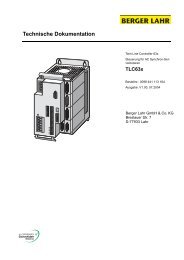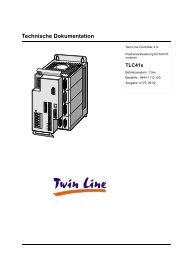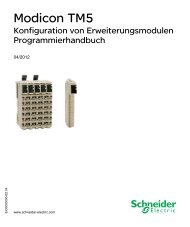Programming manual M238 | 3 MB - BERGER - POSITEC
Programming manual M238 | 3 MB - BERGER - POSITEC
Programming manual M238 | 3 MB - BERGER - POSITEC
You also want an ePaper? Increase the reach of your titles
YUMPU automatically turns print PDFs into web optimized ePapers that Google loves.
Controller States and Behaviors<br />
Initialization Values<br />
This output state applies in the BOOTING, EMPTY (following power cycle with no<br />
boot application or after the detection of a system error), and INVALID_OS states.<br />
Output Forcing<br />
In the initialization state, analog, transistor and relay outputs assume the following<br />
values:<br />
For an analog output : Z (High Impedance)<br />
For a fast transistor output: Z (High Impedance)<br />
For a regular transistor output: 0 Vdc<br />
For a relay output: Open<br />
The controller allows you to force the state of selected outputs to a defined value for<br />
the purposes of system testing, commissioning and maintenance.<br />
You are only able to force the value of an output while your controller is connected<br />
to SoMachine.<br />
To do so you use the Force Values command in the Debug/Watch menu.<br />
Output forcing overrides all other commands to an output irrespective of the task<br />
programming that is being executed.<br />
When you logout of SoMachine when output forcing has been defined, you are<br />
presented with the option to retain output forcing settings. If you select this option,<br />
the output forcing continues to control the state of the selected outputs until you<br />
download an application or use one of the Reset commands.<br />
When the option Update IO while in stop, if supported by your controller, is<br />
checked (default state), the forced outputs keep the forcing value even when the<br />
logic controller is in STOP.<br />
Output Forcing Considerations<br />
The output you wish to force must be contained in a task that is currently being<br />
executed by the controller. Forcing outputs in unexecuted tasks, or in tasks whose<br />
execution is delayed either by priorities or events will have no effect on the output.<br />
However, once the task that had been delayed is executed, the forcing will take<br />
effect at that time.<br />
Depending on task execution, the forcing could impact your application in ways that<br />
may not be obvious to you. For example, an event task could turn on an output.<br />
Later, you may attempt to turn off that output but the event is not being triggered at<br />
the time. This would have the effect of the forcing apparently being ignored. Further,<br />
at a later time, the event could trigger the task at which point the forcing would take<br />
effect.<br />
EIO0000000384 04/2012 55



